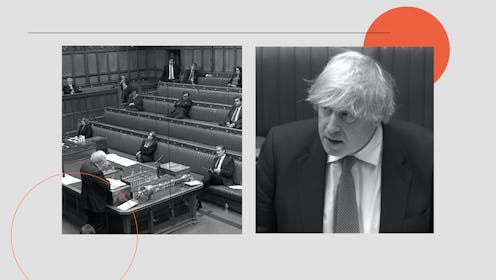News
What The UK's Foreign Office & Foreign Aid Merger Means For The World's Most Vulnerable

On June 16, Boris Johnson announced that the Department for International Development (DfID) will be merged with the Foreign and Commonwealth Office (FCO). Immediately it was met with widespread anger and disappointment among charities, civil servants and political commentators alike. The move has been described as “an act of political vandalism” by Christian Aid and "a return to the shady era of 'aid for trade'" by The Independent. And that is just the tip of the iceberg. This amalgamation of two very different offices will directly affect and hurt the world’s poorest and most vulnerable people. Here's what the Foreign Office & Foreign Aid merger means, and why we should all take note.
What does the Foreign Office & Foreign Aid merger mean?
The decision, announced in the Commons on June 16 by the PM, reverts back to the pre-1997 arrangement. It effectively folds DfID into the FCO, renaming it as the Foreign, Commonwealth and Development Office (FCDO).
It is a move that has long been mooted by Conservatives. Foreign Secretary Dominic Raab suggested it when he ran for Conservative leader in June 2019 and Johnson has long spoken about it. January 2019 he told The FT: "We can’t keep spending huge sums of British taxpayers’ money as though we were some independent Scandinavian NGO.”
The merger of the FCO and DfID effectively means that "the aid and foreign policy briefs are to be again managed under the one roof," as per The New Statesman.
Why does it matter if DfID is reabsorbed into the Foreign Office?
Currently, the FCO - itself the result of merging the Foreign Office and the Commonwealth Office in 1968 - is responsible for protecting and promoting British interests worldwide. DfID is responsible for international aid and charitable relief. They sound similar, and indeed have shared interest at times, but they operate very differently; practically and ideologically.
FCO is adept at understanding the politics of countries around the world, whilst DfID is compromised of a team of programme managers with development expertise. DfID was established in 1997 follow a number of controversies, including the Pergau dam scandal, which saw the UK government under Thatcher spend £234 million of British aid money building a dam in Malaysia in exchange for a lucrative arms deal. It was declared unlawful in the High Court and effectively redefined British aid.
The aim of DfID was to avoid other such "arms for aid" affairs, while alleviating global poverty and promoting sustainable development. Since its creation, the department has cultivated an international standing as a leader in the field of development and "represents a pillar of the UK’s soft power on the international stage," argues The New Statesman. Former DfID public servant and current policy coordinator at Cash Learning Partnership Sophie Tholstrup's Twitter thread eloquently summarises why this is a terrible idea.
Why is this merger happening now?
The creation of the FCDO has been a popular idea among Conservatives for some time, especially now that Britain is reshaping its role on the global stage, post-Brexit; what Johnson is calling "Global Britain".
There has long been a feeling among Conservatives that the 0.7% of national income that is earmarked for overseas aid is wasted in efforts to meet that target, and that the money could be "better leveraged" in a way that might be more advantageous to the UK’s wider foreign policy interests.
How will the new system operate?
The new department will be led by the Foreign Secretary, Dominic Raab, the same man who said on live radio that he thinks taking a knee "seems to be taken from Game of Thrones" and "feels to me like a symbol of subjugation and subordination."
Raab will be empowered to decide which countries receive – or cease to receive – British aid. According to the Government website, he will do so "in line with the UK’s priorities overseas, harnessing the skills, expertise and evidence that have earned our reputation as a leader in the international development community."
Speaking in the House of Commons on June 16, Johnson proposed that a review of the countries receiving aid will take place, suggesting that less money would go to Zambia or Tanzania, and more would go to Ukraine and the Western Balkans, for example, where there are vital European security interests. “We give ten times as much aid to Tanzania as we do to the six countries of the Western Balkans," he said, "who are acutely vulnerable to Russian meddling.”
How will the merger affect charitable funding?
In short? Profoundly.
This decision puts politics above the needs of the poorest people and will mean more people around the world will die unnecessarily from hunger and disease
International charities have spoken out about their concerns, saying this move could mean the UK's commitment to using the DfID's powerful aid budget - which at £15bn last year dwarfed the £2.4bn spent by the FCO - would be watered down and may see the money focused on UK national interests and less on poverty reduction.
Johnson did say in the Commons that “reducing poverty will remain central to the mission of the new FCDO”, with the UK committed to continuing to spend 0.7% of national income on overseas development assistance. But many, including Danny Sriskandarajah, chief executive at Oxfam, have said the move is “scarcely believable” during the coronavirus pandemic.
“This decision puts politics above the needs of the poorest people and will mean more people around the world will die unnecessarily from hunger and disease,” said Sriskandarajah. “The Foreign Office may be excellent at diplomacy, but it has a patchy record of aid delivery and is not as transparent as DfID.”
When will the merger take place?
Work will begin immediately on the merger, with the new department due to be established in early September.
This article was originally published on